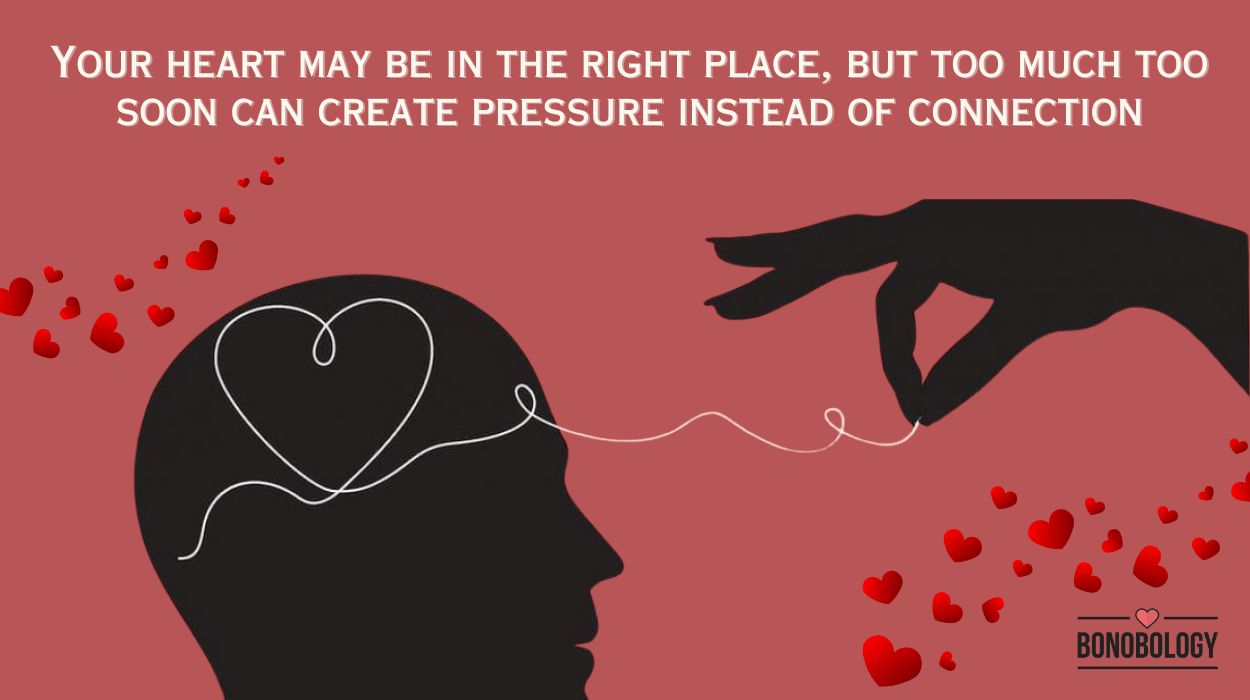Love bombing is a form of psychological and emotional abuse that is often disguised as excessive flattery, a preferred tool of narcissists to charm a romantic interest and gain control over them. However, this pattern of behavior isn’t always calculated and premeditated. Sometimes, owing to their own emotional baggage, a person may end up perpetuating these behaviors without even realizing that they’re doing it. That’s known as unintentional love bombing.
However, just because a behavior is unintentional does not mean that it is not unhealthy or harmful to your relationships. If you tend to be too intense at the beginning of a romantic connection or overextend yourself to win the favor of a romantic interest or partner, only to end up overwhelming them, you need to ask yourself, “Am I accidentally love bombing the person I like/have feelings for?”
Let’s help you find the answer to this seemingly daunting question by diving deeper into the unintentional love bombing meaning, the reasons behind it, the warning signs that you may be guilty of i,t as well as a way to break this pattern, with insights from some renowned mental health and relationship experts.
What Is Unintentional Love Bombing?
Unintentional love bombing occurs when someone showers their partner with excessive affection, attention, and gifts early in a relationship without realizing that this overwhelming behavior can be manipulative or harmful. Unlike deliberate love bombing, which is a calculated control tactic, unintentional love bombing stems from genuine feelings, but it can still be just as harmful to a budding romantic connection.
Psychotherapist Ami Kaplan, LCSW, notes that while love bombing is often associated with narcissistic personality disorder, “anyone is capable of love bombing.” She emphasizes that in many cases, it is an unconscious behavior that stems from a person’s attachment style, self-esteem, and social conditioning. Let’s explore how each of these factors can contribute to a person love bombing their partner, even if there is no malicious intent behind their actions:
Attachment style and early life experiences

According to attachment theory, the way we form relationships in adulthood is often influenced by our early interactions with caregivers. If a person experienced inconsistency or neglect growing up, they might unconsciously overcompensate in relationships by showering their partner with excessive love and attention. This behavior is often driven by a deep-seated fear of abandonment or rejection.
Psychotherapist Dr. Laura Berman explains, “Individuals with an anxious attachment style may overwhelm their partner with affection, not realizing they’re crossing boundaries, in an attempt to ensure that their partner won’t leave.” For instance, if you have an anxious attachment style you might feel the need to constantly reassure your partner of your love and devotion, as a way of securing their commitment, or seek reassurance from them to convince yourself that they’re not going to leave you, even if there have been no indicators that they might.
Insecurity and fear of rejection
Unintentional love bombing can be a result of a person’s underlying insecurities. When you fear that your partner might pull away from you because something similar has happened to you in the past, or are unsure of their feelings, you might overcompensate by trying to create closeness and connection through constant praise, attention, or contact. In this case, being overly affectionate or excessively communicative are ways to feel more secure in the relationship.
Dr. Alexandra Solomon, a licensed psychologist, explains, “People who have experienced past rejections or abandonment may go to great lengths to ensure their current partner doesn’t leave them, even if it means overwhelming them.”
Self-worth tied to a relationship
A tendency to become overly invested in a relationship because you feel like your partner defines your self-worth can also lead to unintentional love bombing. If you begin to view a relationship as an accomplishment that defines your worth, you may go out of your way to make sure everything is perfect all the time and end up investing excessive emotional energy into the relationship, which might lead to you inadvertently disregarding your partner’s boundaries.
Reiterating this, relationship therapist Dr. Carla Manly says, “When someone places too much of their self-worth in the hands of another person, they can unintentionally overwhelm their partner with excessive love bombing in an effort to maintain that emotional connection.”
Idealizing a partner
Idealization is a natural part of the early stages of romantic relationships. When you’re in the fabled honeymoon phase, you view your partner as “perfect” or “the one”. While this is a natural rite of passage for romantic relationships, if you take this idealization too far by constantly expressing your admiration to let your partner know how much you adore or value them, it can leave them feeling uncomfortable or pressured.
“In relationships, some individuals can become so enamored with their partner that they begin to focus all their energy on them, trying to maintain that high level of admiration, not realizing that it may overwhelm their partner.”
—Dr. Shannon Kolakowski, a clinical psychologist
Social conditioning
Relationship therapist Dr. Emily Roberts notes, “Society often teaches us that love should be shown in dramatic ways, and people can internalize these messages, leading to behavior that may overwhelm or pressure their partner.” If you’re taken by the idea of all-consuming and passionate love depicted in movies and TV shows, you may think constant gestures of affection and grand romantic expressions are the only ways to make your partner feel loved. However, what’s “normal” for you may feel excessive to your partner.
9 Actions That Suggest You May Be Love Bombing Your Partner Without Knowing It
Now that you understand the unintentional love bombing meaning, perhaps it will be a little easier for you to identify if you’ve been unwittingly overwhelming your romantic partner with too much too soon. While your heart may be in the right place, not being mindful of your partner’s boundaries and leaving room for the natural progression of a relationship can backfire.
Consider Melinda and George, who met through mutual friends. George was instantly taken by Sarah and asked her out on a date. While the date went well, George’s behavior afterward had Melinda running in the opposite direction. Less than an hour after their first date ended, George sent a text saying what a great time he had. It was all well and good till this point, Melinda even appreciated George’s candor. But then, the messages wouldn’t stop coming.
He kept sending her overtly romantic messages throughout the night, and the following day, expressing how he had never felt this way about anyone before. By the end of the day, he asked for a second date. Flattered by how into her George was, she agreed. Within a week, he surprised her with an expensive necklace and asked her to go away with him for a weekend getaway.

Now, Melinda started feeling overwhelmed by the rapid pace and intensity of this budding romantic connection. She enjoyed George’s company but wasn’t ready for such swift advancements. George’s intentions were sincere; he believed that by expressing his feelings so openly and grandly, he was solidifying their bond. However, his actions inadvertently pressured Melinda, making her feel rushed and uneasy. She ultimately said she could no longer continue seeing him.
If that sounds a lot like how you behave at the beginning of a romantic relationship, it’s definitely worth giving some real thought to the question, “Am I accidentally love bombing?” Even if the objective is not control or manipulation in relationships, your actions can get in the way of forming a genuine connection with someone you like. Here are 9 such actions that suggest you’re unintentionally love bombing your partner and need to rethink your approach:
1. Constantly texting or calling
Texting or calling your partner all the time to check in or tell them how much you care is one of the most classic unintentional love bombing examples. Dr. Alexandra Solomon, a clinical psychologist, explains, “When one partner constantly reaches out, it can create a sense of obligation, not connection.” Your partner may feel pressured to reciprocate, and this can quickly lead to a sense of feeling suffocated in the relationship. Now, how do you know that the frequency of your calls and texts is over the top? Well, here are a few indicators:
- You send multiple texts in a row if they don’t reply
- You call multiple times throughout the day, never giving your partner a chance to reach out on their own
- Your guilt-trip your partner when they can’t or won’t reciprocate
2. Planning over-the-top dates or surprises

Planning elaborate dates or grand gestures is another way you may be overwhelming your partner by coming across as too intense. Another reason why this is a red flag is that it often stems from an underlying feeling of not being good enough, which can lead to overcompensation. Dr. Manly notes, “Sometimes, grand gestures are used to compensate for a fear of inadequacy or to create a false sense of closeness.” If you’re wondering, “Am I accidentally love bombing my partner?”, see whether you’re guilty of the following behaviors:
- Organizing surprise trips or romantic dinners frequently
- Going overboard with gifts or lavish acts of affection
- Planning things without paying any mind to whether these align with your partner’s comfort
3. Overwhelming your partner with compliments
I know what you’re thinking—who doesn’t like compliments! While that is true and compliments are essential for showing appreciation toward your partner, too much of it, especially early on, can make them feel uncomfortable. Dr. Shannon Kolakowski, a psychologist, says, “If you constantly tell your partner how amazing they are, it can create a dynamic where they feel like they’re not allowed to show any flaws.”
4. Forcing closeness and intimacy
Pushing your partner to be more intimate than they’re ready for is another sign of unintentional love bombing. If they need space and you push for constant closeness, it can feel smothering. Relationship therapist Dr. Roberts, “Pushing for closeness too soon, without respecting boundaries, can create anxiety and resistance in your partner.” Here is when your attempts at building intimacy in a relationship turn into one of the unintentional love bombing examples:
- Insisting on deep, personal conversations that your partner isn’t comfortable with
- Trauma dumping in the name of stimulating vulnerability in the relationship
- Insisting on meeting big relationship milestones like moving in together early in the relationship
5. Making big promises too soon

Sometimes, in the excitement of a new relationship, you might make promises or declarations that are premature, like talking about a future together after only a few weeks of dating or referring to your partner as “the one” or your “soulmate” when you haven’t even had your first fight yet. Dr. Berman explains, “Making sweeping promises like marriage or forever early on can create unrealistic expectations and put undue pressure on the relationship.”
6. Spending all your free time together
I get it, when you meet someone new and are hopelessly smitten, you want to spend every waking moment with them. However, just because you want something, doesn’t mean it’s healthy for you. You may even want to polish off a pound of cake every day but you know where that’s going to lead you. The same is true for your relationship.
When you act on your desire to be around a new partner as much as possible and constantly make plans to spend all your free time with your partner, you crush any scope for personal space and this can make your partner feel like you’re overtaking their entire life, leaving no room for them to honor their other commitments or just focus on self-care.
“Healthy relationships thrive on a balance of togetherness and individuality. If you overdo the time spent together, you risk stifling your partner’s need for independence.”
—Dr. Alexandra Solomon, clinical psychologist
7. Ignoring their need for space
A key sign of love bombing is not recognizing when your partner needs personal time or space, even when they explicitly ask for it. Your partner may go along with your over-the-top gestures for a while, but at some point, they will either directly tell you that they need some space or may hint at it by coming up with excuses to turn you down when you suggest one plan after another or smother them with calls and texts.
If instead of respecting their boundaries, you might continue to shower them with affection or try to be around them constantly, you are love bombing them like it’s nobody’s business. Explaining why this is unhealthy, Dr. Kolakowski explains, “If your partner is distancing themselves, and you push for more closeness, you risk violating their personal boundaries, leading to resentment.”
8. Over-prioritizing their happiness over your own
While a relationship needs to be a priority in your life, it shouldn’t be the top or the only priority. If you’re neglecting your own needs or constantly prioritizing your partner’s, you’re paving the way for an extremely unhealthy dynamic.
Dr. Manly explains, “When you only focus on making your partner happy and neglect your own happiness, you risk developing a codependent dynamic that is unhealthy for both parties.” This may also lead to feelings of being emotionally drained, both for you and your partner. Here are some examples of how not setting your priorities right is also a form of unintentional love bombing:
- You cancel plans without a second thought if it means you get to spend time with your partner
- You plan your entire day or life around your partner’s needs, even if it leaves you feeling depleted
- You over-commit to doing things that you think will make them happy, without considering your own comfort or well-being
9. Making everything about the relationship

As I said, while a relationship is a priority, it’s not the only one. When everything you do is centered around the relationship, it can feel as though there’s no room for individuality or personal growth, which can make the connection feel stagnant and suffocating pretty quickly. Dr. Berman says, “It’s natural to want to focus on your partner, but if the relationship becomes all-consuming, it can lead to feelings of suffocation or emotional burnout.”
Impact Of Unintentional Love Bombing On A Relationship
Even if you can relate to the above-mentioned behaviors in a relationship, you may think, “I have strong, genuine feelings for my partner, and I want to express them. What’s so wrong with that? Is love bombing always bad? Well, it’s important to recognize that even well-meaning actions can sometimes overwhelm a partner and cost you a relationship that could have blossomed into something deep and meaningful had you given it time to grow organically. Unintentional love bombing chips away at the very foundation of a relationship in the following ways:
1. It emotionally overwhelms your partner
When you shower your partner with affection and attention constantly, it can feel overwhelming for them, especially if they need more space or time to process their feelings. For example, if you text or call your partner multiple times a day, even when they haven’t responded yet, they might start to feel anxious about communication with you, and this can lead to emotional fatigue.
2. Makes your partner feel pressured to reciprocate
Love bombing can create an unspoken expectation for your partner to match your level of affection or commitment, which can make them feel inadequate or guilty if they don’t feel the same way at the same pace. Dr. Manly explains, “When one partner pours out excessive love, it can unintentionally place pressure on the other to feel or act in the same way, which can create anxiety or self-doubt.”
3. Causes an imbalance in the relationship

If you’re always initiating plans, making decisions for the relationship, and expressing your feelings, your partner might start to feel like they’re being carried along rather than actively participating in the relationship. This creates a lopsided equation rather than a partnership of equals.
Dr. Berman says, “When one partner dominates the emotional giving in the relationship, it creates an imbalance that can lead to resentment, withdrawal, and ultimately, a disconnect.” After a point, you may begin to feel like you’re giving too much of yourself to the relationship and feel constantly disappointed that your partner doesn’t reciprocate. On the other hand, your partner may find your behavior unreasonable and push back with, “Well, I didn’t ask for any of this.”
4. It creates feelings of inauthenticity
When the expressions of love are too intense or sudden, it creates a sense of inauthenticity and can leave your partner to question whether your feelings are genuine or if you’re only behaving this way because you think it’s what they want to hear. Dr. Roberts says, “Even when love bombing is unintentional, it can come across as excessive or scripted, leading the recipient to doubt the authenticity of the connection.”
5. It leads to unmet expectations
Dr. Solomon says, “Unmet expectations can result from a mismatch in how affection is expressed, and this can create tension if both partners aren’t on the same page emotionally.” If you constantly express your feelings of love and devotion but your partner doesn’t reciprocate in the same way, you might start feeling frustrated or uncertain about their commitment. At the same time, overwhelmed by your constant affection, your partner might begin to withdraw emotionally. You might expect your partner to feel just as strongly, but they may need more time to match your pace. This creates a mismatch that can threaten the very existence of a relationship.
6. Healthy communication is hindered
Why is love bombing always bad, you wonder? Well, picture this: your partner has had a rough day at work and is looking to spend some quiet time to clear their head, or maybe they want to go out with their friends and blow off some steam. But you show up at their workplace, flowers in hand, dinner reservations made, hoping for a romantic date, except your partner isn’t in the right headspace for it, and it leads to a fight.
You’re heartbroken that they don’t appreciate your thoughtful gesture. They’re furious that you just won’t back down and give them a minute to breathe. That’s what happens when you love bomb a partner. You might be so focused on showing your partner how much you care that you forget to ask how they’re feeling or to give them space to express their thoughts and concerns.
When one person is consistently over-pouring affection, the focus of the relationship may shift away from open communication to trying to ‘manage’ or ‘receive’ love, and in the process, you miss out on the opportunity to build mutual understanding and connection.
“Love bombing can inadvertently shift the dynamic from open communication to managing emotional needs, where both partners feel their needs aren’t being fully expressed.”
—Dr. Carla Manly, relationship therapist
7. It fuels doubt and insecurity
Dr. Kolakowski says, “Love bombing can lead to self-doubt for the recipient, who may feel overwhelmed by the pace or intensity, leading them to pull away to reassess their own feelings.” If your partner is caught off guard by the intensity of your affection, they might start doubting their own feelings or whether they’re truly ready for such an intense commitment. This can cause them to pull away and trigger feelings of insecurity in you.
7 Ways To Correct Unintentional Love Bombing In Relationships
If you’ve recognized that your actions may unintentionally be love bombing your partner, it’s great that you’re looking to correct it. Here are seven actionable ways to adjust your behavior and bring more balance and mutual respect into your relationship. These strategies will help you create a healthier dynamic while still nurturing the connection between you and your partner.
1. Recognize and respect their boundaries
Everyone needs space to process their feelings, and that includes time apart from constant affection or communication. That’s why, one of the first steps in correcting unintentional love bombing is learning to recognize and respect your partner’s emotional boundaries. Start by asking your partner about their boundaries. For example, “I realize I’ve been texting a lot. How do you feel about that? Do you need space sometimes?”
Then, make an effort to respect whatever boundaries your partner lays out. For instance, if they say they have been feeling overwhelmed by the expectation of constant communication, practice waiting before you send multiple messages or call repeatedly. Give your partner time to respond on their own.
“Recognizing and respecting boundaries is key to building trust and mutual respect in a relationship. When you can give each other space, you show that you care about their needs as much as your own.”
— Dr. Alexandra Solomon, relationship expert
2. Slow down and give your partner time to catch up
Instead of rushing through the relationship milestones or pushing for deeper intimacy, take a step back and allow your partner time to process and match your level of affection. Dr. Roberts, a relationship therapist, suggests, “Allow your partner to take the lead on certain aspects of the relationship. Don’t feel the need to force closeness or commitments before they’re ready.”
This will prevent overwhelming them and give the relationship room to grow at a healthy pace. If you’ve already made big declarations or talked about a future together, try to ease off those topics. Let your partner initiate these conversations when they feel comfortable. Focus on enjoying the present moments with your partner without rushing to define the future.
3. Balance your affection with healthy communication
While affection in a relationship is important, it shouldn’t overshadow the importance of regular, balanced communication. Ensure that your conversations are about more than just affection—discuss your thoughts, feelings, and even concerns openly.
Dr. Kolakowski says, “Balance is key. When you communicate openly about your emotions without overwhelming the other person with affection, you create space for both partners to feel heard and understood.” To be able to do that, you need to
- Focus on building a foundation of trust and communication
- Make time to check in with your partner about their needs, worries, and desires
- Ask more open-ended questions like, “How are you feeling about us right now?”
4. Allow your partner to take the lead sometimes

If you tend to take charge of the relationship—whether through initiating plans, making decisions, or giving all the affection—it can help to take a step back and let your partner take the reins now and then. This not only shows trust but also helps create a more equal dynamic where both partners contribute.
Dr. Manly emphasizes, “A healthy relationship thrives when both partners feel like they have equal input and ownership. Letting your partner take the lead fosters a more collaborative partnership.”
5. Give space for individuality and personal interests
It’s easy to become overly absorbed in the relationship, but maintaining individual interests and allowing your partner to do the same will prevent the relationship from becoming all-consuming. It’s essential to nurture not only your relationship but also your personal growth and independence. You can do this by
- Encouraging your partner to pursue their own hobbies and passions, and doing the same for yourself
- Instead of always making plans together, respect moments when your partner needs personal time, whether it’s for self-care or spending time with friends
6. Be aware of your expectations and adjust them
Love bombing often creates unrealistic expectations where your partner might feel pressured to reciprocate with the same level of intensity. By being mindful of these expectations and adjusting them, you can ease the pressure on your partner.
Dr. Berman notes, “When you have realistic expectations for how affection is shown and received, it allows both partners to feel comfortable at their own pace.” So,
- Reevaluate the pace at which you’re expecting the relationship to progress
- Allow your partner to take their time and express their feelings naturally
- Instead of always expecting immediate affection or gestures, give your partner room to express these organically
- Focus on enjoying the small moments together

7. Engage in self-reflection and self-awareness
Self-reflection and self-awareness hold the key to correcting unintentional love bombing. Dr. Solomon advises, “Self-awareness is crucial. By understanding your motivations for overdoing affection, you can make conscious decisions to express love in healthier, more balanced ways.”
Understanding why you engage in love bombing—whether it’s to fill an emotional void, boost your own self-esteem, or because of fear of abandonment—can help you take a step back and adjust your behavior.
- Spend time reflecting on your behavior and how it may be affecting your partner.
- Ask yourself, “Am I giving too much too soon?” or “Am I trying to control the pace of the relationship out of fear?”
- If you notice yourself reverting to old habits, check in with your partner and apologize if needed
- Let them know you’re committed to respecting their boundaries
FAQs
1. Can love bombing be unintentional?
Yes, love bombing can be unintentional. While it’s often associated with manipulative behavior in toxic relationships, some people may overwhelm their partner with affection simply because they are deeply infatuated, have an anxious attachment style, or believe grand gestures are essential in love. They may not realize their intensity is suffocating or unsustainable.
Key Pointers
- Unintentional love bombing occurs when someone showers their partner with excessive affection, attention, and gifts early in a relationship without realizing that this overwhelming behavior can be manipulative or harmful
- This behavior stems from factors like anxious attachment styles, insecurity, fear of rejection, low self-worth tied to relationships, idealization of a partner, and social conditioning that promotes grand romantic gestures
- Constant communication, over-the-top gestures, excessive compliments, pushing for closeness, and ignoring boundaries are some signs you may be unintentionally love bombing your partner
- Overwhelming affection can create emotional fatigue, pressure to reciprocate, relationship imbalance, and feelings of inauthenticity
- It can also lead to unmet expectations, hinder communication, and fuel doubt and insecurity in a relationship
- To correct this tendency, you need to recognize and respect boundaries, slow down the pace, balance affection with communication, allow your partner to take the lead, encourage individuality, adjust unrealistic expectations, and engage in self-reflection for healthier relationship dynamics
Final Thoughts
Unintentional love bombing can strain a relationship if one partner feels overwhelmed, pressured, or emotionally exhausted. By being aware of these potential effects, you can adjust your behavior to ensure that your love is expressed in a healthy and balanced way. It’s all about respecting each other’s pace and emotional needs while maintaining open, honest communication. Love should feel natural, not forced, and when both partners are allowed to grow and move at their own pace, the relationship will naturally strengthen.
Your contribution does not constitute a charitable donation. It will allow Bonobology to continue bringing you new and up-to-date information in our pursuit of helping anyone in the world to learn how to do anything.




